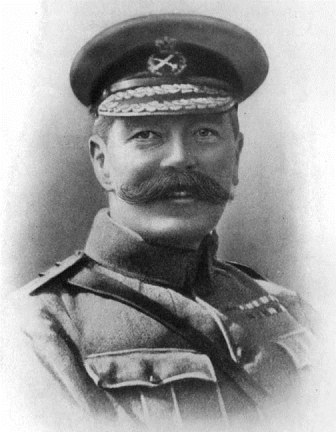13 August 1915
SUVLA - General Sir Ian Hamilton, Headquarters, Middle Eastern Expeditionary Force - Still frustrated with the lack of progress at Suvla, Hamilton went to visit Stopford again. In the following passage from his diary he mentions the 1/5th Norfolks loss, but remains focussed on plans for an attack the following day. Using the remainder of 163 Brigade and 54th Division Hamilton wanted Kavak Tepe taken. This would be a big ask for the regular army, let alone what Hamilton had available on the field at Suvla.
 Photograph: Lord Kitchener as published in the book "KITCHENER ORGANIZER OF VICTORY" by Harold Bedbie. This book was about K's earlier exploits, published before Gallipoli in February 1915.
Photograph: Lord Kitchener as published in the book "KITCHENER ORGANIZER OF VICTORY" by Harold Bedbie. This book was about K's earlier exploits, published before Gallipoli in February 1915.
"Stopford then came aboard; in the mood he was in aboard the Jonquil on the 8th,—only more so! The Divisional Generals are without hope, that is the text of his sermon. Hopeless about to-night, or to-morrow, that is to say; for there are rosy visions and to spare for next week, or the week after, or any other time, so long as it is not too near us. There is something in this beats me. We are alive—we are quite all right—the Brigade of the LIVth sent on to Kuchuk Anafarta Ova made good its point. True, one battalion got separated from its comrades in the forest and was badly cut up by Turkish snipers just as was Braddock's force by the Redskins, but this, though tragic, is but a tiny incident of a great modern battle and the rest of the 163 Brigade have not suffered and hold the spot whence, it was settled, the attack on Kavak Tepe should jump off. Nothing practical or tactical seems to have occurred to force us to drop our plan."
"But no; Stopford and Reed count the 53rd Division as finished: the 54th incapable of attack; the rest of the IXth Corps immovable. If I accept; we have lost this battle. We are not beaten now—the men are not—but if I accept, we are held up."
"There is no way out. Whether there is any good looking back even for one moment, God knows; I doubt it! But I feel so acutely, I seem to see so clearly, where our push for Constantinople first began to quit the rails, that I must put it down right here. The moment was when I asked for Rawlinson or Byng, and when, in reply, the keen, the young, the fit, the up-to-date Commanders were all barred. The question that keeps troubling me is, ought I to have fought it further; ought I to have resigned sooner than allow generals old and yet inexperienced to be foisted on to me?"
"I know quite well both Territorial Divisions. I knew them in England that is to say. Since then, they have had their eyes picked out. They have been through the strainer and the best officers and men and the best battalions have been serving for months past in France. The three show battalions in the 54th (Essex) Division are in France and their places have been taken by the 10th and 11th London and by the 8th Hants. Essex is good; London is good and Hants is good; but the trinity is not Territorial. The same with the Welshmen. Yet even so; taking these Territorials as they are; a scratch lot; half strength; no artillery; not a patch upon the original Divisions as I inspected them in England six months ago; even so, they'd fight right enough and keen enough if they were set fair and square at their fence. In the fight of the 10th the Welshmen were not given a chance. Sent in on a narrow front—jammed into a pocket;—as they began to climb the spur they caught it from the guns, rifles and machine guns on both flanks."
Defeated by his generals, Hamilton drafted a cable to his old friend, and commander, Lord Kitchener, describing the Suvla situation. Victory had escaped them, and there appeared little hope of a favourable change ahead:
"The result of my visit to the IXth Corps, from which I am just back, has bitterly disappointed me. There is nothing for it but to allow them time to rest and reorganize, unless I force Stopford and his Divisional Generals to undertake a general action for which, in their present frame of mind, they have no heart. In fact, these generals are unfit for it. With exceeding reluctance I am obliged to give them time to rest and reorganize their troops."
"Though we were to repeat our landing operations a hundred times, we would never dare hope to reproduce conditions so favourable as to put one division ashore under cover of dark and, as the day broke, have the next division sailing in to its support. No advantage was taken of these favourable conditions and, for reasons which I can only explain by letter, the swift advance was not delivered,—therefore, the mischief is done. Until we are ready to advance again, reorganized and complete, we must go slow."
"SOURCE:
Sir I Hamilton, Gallipoli Diary, Vol.II, (Edward Arnold: London 1920), pp.99-102.
